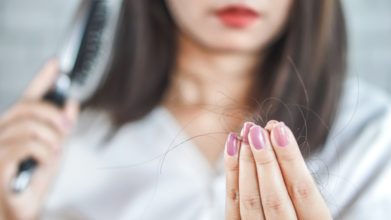- Health Conditions A-Z
- Health & Wellness
- Nutrition
- Fitness
- Health News
- Ayurveda
- Videos
- Medicine A-Z
- Parenting
- Web Stories
Did You Know? These Surprising Body Parts Could Reveal the First Signs of High Cholesterol

High cholesterol often develops silently, without symptoms, and increases your risk of heart disease and stroke over time. That is why it is often called the “silent” threat. It can quietly clog your arteries for years without so much as a headache. But in some cases, the body shows early warning signs, not through chest pain or breathlessness, but in places you might not expect: your eyes and ankles.
In your eyes, specifically, your iris. According to the British Heart Foundation, one early red flag is a pale grey or white ring forming around the coloured part of your eye, a sign known as corneal arcus. In people over 60, it is usually nothing to worry about. But in younger adults, it could point to dangerously high cholesterol levels.
It is caused by fat deposits building up in the outer edges of your cornea. The ring would not hurt and would not affect your vision, which makes it all the more tough. But it is visible, and that makes it one of the few outward signs of a hidden problem.
Now, down to your ankles. Another unexpected place cholesterol might show up is under the skin in the form of xanthomas, soft, yellowish lumps that often appear around tendons or joints, especially near the ankles. These are not just cosmetic oddities. They are fatty growths, and they usually mean your body's cholesterol levels are sky-high, often dangerously so.
These lumps are caused by cholesterol leaking out of your blood and getting trapped in the skin. According to the British Heart Foundation, their presence is a major red flag, particularly if they appear in people with a family history of heart disease or a genetic condition called familial hypercholesterolaemia, where cholesterol levels are high from birth.
The trouble is, most people ignore these signs. A ring in your eye? Probably ageing. Lumps near your ankle? Maybe a strain or skin issue. But shrugging them off could delay diagnosis and treatment.
That is why awareness matters. If you are under 45 and notice a ring around your iris or strange, painless bumps around your joints, you might want to book a cholesterol test. It is a simple blood draw that could tell you a lot about what is going on inside.
If left unchecked, high cholesterol raises your risk of heart attacks and strokes. But caught early, it is manageable. Diet tweaks, regular exercise, and, if needed, medication can help bring your levels back to where they should be.
Is It Hair Fall Or Hair Loss? Here’s How to Tell And When to Seek Professional Help

Credits: iStock
Noticing more strands on your pillow, in the shower drain, or tangled in your brush can feel alarming. But this is the surprise: not all shed hairs are a sign of lasting damage. Occasionally it's just temporary shedding, sometimes it's real hair loss that requires intervention. Knowing and understanding the difference will save you from unnecessary panic and prevent you from acting too late.
Hair loss tends to creep up gradually, leaving individuals confused about what's actually going on. Losing a strand or two is normal in the natural cycle, but when clumps show up in your brush or your scalp begins showing through, it's tempting to freak out. Knowing the distinction between normal shedding and ongoing loss is the starting point for safeguarding your hair health. That's where professional advice can come into play. Dr. Deepak Choudhary, Senior Master Surgeon and Trainer of DHI International, states that the difference is based on both the pattern and the permanence.
"We shed 50 to 100 hairs a day, which is a natural hair cycle. But if you begin to notice clumps of hair falling out, heavy shedding, or unusual thinning, it is referred to as hair loss. Hair loss tends to be patchy with apparent thinning, but hair fall tends to be even all over the scalp," says Dr. Choudhary.
Understanding the difference is important, not only for peace of mind, but also to decide when to consult a professional.
What Is Hair Fall?
Hair will go through three natural cycles, which are anagen (growth), catagen (transitional stage), and telogen (resting stage). The hair falls out at the end of the telogen phase to give way to new growth. This telogen effluvium is what dermatologists refer to as a condition that causes excessive shedding because of a break in this cycle. Physical or emotional stressors usually cause excessive shedding. Some of the stressors include:
- Sudden loss of 20 pounds or more
- Childbirth
- Excessive stress, e.g., illness in the family, divorce, or loss of a job
- Severe fever or serious illness
- Surgery
- Stopping birth control pills
Usually, this shedding happens several months following the precipitating incident. For instance, new moms tend to notice extreme shedding two months after giving birth, and then it tends to peak at four months before tapering off. In the majority of instances, regular fullness resumes between six and nine months as the body gets back into balance.
Yet, if stressors are prolonged, shedding will last longer.
What Is Hair Loss?
Losing hair differs from shedding. Medically referred to as anagen effluvium, it is when something prevents hair from growing in the first place. In contrast to telogen effluvium, where hair will grow back, losing hair tends to need attention. The usual causes of hair loss are:
Genetic hair loss: The most common form, commonly referred to as male or female pattern baldness.
Immune system disorder: Disorders such as alopecia areata, wherein the body mistakenly attacks its own follicles.
Medications and treatments: Chemotherapy and radiation are traditional culprits.
Hairstyles and products: Severe braiding, ponytails, and harsh chemicals can harm follicles.
Trichotillomania: An urge to pull out one's own hair.
In most instances, hair grows back only once the underlying cause has been treated. Some forms of inherited hair loss, for instance, persist untreated and might need long-term measures.
Hair Fall vs Hair Loss: Spotting the Warning Signs Early
A majority of individuals overlook initial signs of abnormal hair loss until the issue becomes evident. However, minor changes can act as red flags:
- Clumps of hair seen upon brushing or showering
- Thinning which is apparent, e.g., reducing ponytail size
- Balding at the crown or receding hairline (particularly in men)
- Patchy bald patches on the head or body
- Textural changes, with brittle or easily breakable hair
- Identifying these changes in time can be a huge improvement in treatment success.
Dr Deepak continues to say that whereas basic hair fall is easily controlled with topical medications, drugs, and proper hair care, genuine hair loss usually calls for more sophisticated interventions.
Why Are Hair Transplants on The Rise?
For chronic or progressive hair loss, minimally invasive transplant procedures are bringing new hope. One such treatment is Direct Hair Implantation (DHI), which takes individual follicles from the safest donor site—the back of the scalp—and plants them on spots where hair has thinned or is bald.
Unlike classical transplant techniques, DHI does not leave scars and offers direct control of angle, depth, and density. This provides natural-looking results that integrate well with the existing hair. Healing is quicker, too, and there's very little discomfort involved.
"Temporary measures can improve the strength of existing hair and reduce shedding, but they won't halt progressive hair loss," explains Dr. Choudhary. "Transplantation, particularly advanced techniques like DHI, delivers a permanent, proven solution for extensive cases.
When to See a Dermatologist?
All hair changes do not need to be treated medically, but if excessive shedding or patches of balding continue, a visit to a dermatologist is a must. Dermatologists are hair, skin, and nail experts and can:
- Diagnose whether the condition is shedding hair or hair loss
- Detect underlying causes, such as hormonal, autoimmune, or drug-related issues
- Prescribe drugs or treatments specific to the condition
- Prescribe or undergo procedures such as PRP (platelet-rich plasma) therapy or transplantation
- The earlier treatment begins, the better the chances of halting progression and restoring growth.
Managing Hair Health at Home
Even if you’re not facing advanced hair loss, healthy habits can support your hair’s natural cycle:
- Eat a balanced diet rich in protein, iron, and omega-3 fatty acids.
- Manage stress with mindfulness, exercise, or therapy.
- Avoid hairstyles that pull on the scalp.
- Use gentle shampoos and conditioners, steering clear of harsh chemicals.
- Shield hair from over-exposure to heat styling and UV rays.
Hair loss and hair shedding can appear on the surface to be similar, but they result from quite different biological mechanisms. Shedding is frequently temporary and self-resolving, whereas genuine hair loss could be due to medical or surgical intervention.
If you’re losing more hair than usual, or noticing thinning patches, don’t wait until it becomes overwhelming. A consultation with a dermatologist can provide clarity and open the door to effective treatments—ranging from medications to advanced transplants like DHI.
What Is The Difference Between Life Expectancy And Healthy Life Expectancy?

‘How long do you think you will live?’, ‘Me? I’ll live till I’m 100 years old!’ As kids these answers were acceptable, full of life and energy, we believed that living till we are 100 was something that can be done. But as we age, we realize, not only is it a pipedream, but life stressors like food, cost of living and how healthy we actually are, can make 100 years sound like hell. Living a long life, like 80 or 70 years old is seen as a reasonable, achievable dream in comparison.
However, the reality of it is much more different than that. You are not being given a choice for a long life, you are paying for a long life with your health. So, if you were to be given a choice, it would be more like, live a perfectly healthy life till 50 or live a long life at the cost of it.
So, when we focus on our health, what should we aim for, long-term healthy years or longer years lived?
What is The Difference Between Life Expectancy And Healthy Life Expectancy?
According to the Royal Borough of Greenwich UK, Life Expectancy (at birth) is the average number of years a person is expected to live in a specific area, based on current death rates. It's a key statistic used to understand the overall health and well-being of a population.
The Life Expectancy gap measures the difference in this number. It can compare life expectancy between men and women or between different geographical areas, like towns or neighborhoods.
On the other hand, Healthy Life Expectancy (at birth) is a more specific measurement. It's the average number of years a person is expected to live in good health, without illness or disability, based on current health and death rates in a particular area.
Have We Been Living Healthier Or Longer?
According to Gov UK, Since the early 2000s, life expectancy has increased more than healthy life expectancy. This means the number of years people spend in poor health has also slightly increased. For example, men now live about 16.1 years in poor health, and women live about 19 years in poor health.
While women still live longer than men, the gap is getting smaller. The difference is now only 3.6 years. However, most of those extra years for women are spent in poor health. Women live 3.6 years longer than men, but they only have 0.7 years more in good health.
Do Older Adults Have Less Healthy Life Expectancy?
The same trend applies to people over 65. They are living longer, but they are also spending more of their later years in poor health. For instance, a 65-year-old man can expect to live an additional 18.8 years, but 8.2 of those years may be in poor health. For a 65-year-old woman, the numbers are 21.2 and 9.9 years, respectively.
This shows that while we're beating old age, we're not always beating the illnesses that come with it. The data suggests we are spending a smaller percentage of our early lives in poor health, but a larger percentage of our later years.
Can We Increase Our Healthy Life Expectancy?
According to the National Institute of Health, genes account for less than a third of your chance of living to age 85. The biggest factor is your behavior and lifestyle. By making healthy choices, most people have the potential to live to a very old age.
Living a healthy lifestyle has a huge impact on your well-being, especially as you get older. A long-term study of a religious group known for healthy living found that they live nearly 10 years longer on average than most Americans. Their secrets? Regular exercise, a vegetarian diet, avoiding tobacco and alcohol, and maintaining a healthy weight.
Experts agree that if you could only do one thing to live longer and healthier, it would be to exercise. Physical activity is crucial for staying active and avoiding disease and disability. Even small amounts of physical activity can help older adults. A study of adults aged 70 to 89 found that those who followed a moderate exercise program had fewer disabilities and recovered faster. A mix of walking, strength training, and balance exercises is especially effective.
Be skeptical of "anti-aging" products or quick fixes. The best and most proven path to a long and healthy life is through common sense habits and an active, engaged lifestyle.
Why Do I Keep Having Stressful Dreams About School? What Do These Recurring Dreams Mean?

It's a simple Monday morning, the sun’s up bright and early, the weather is pleasant, but the anxiety strikes me as soon as I open my eyes. It's the dreaded 10th grade Math exam, the one subject I never excelled at. As if it wasn’t enough that the exam could make or break whether I get enough overall grade to get into my dream schools, if I were to get a bad score on this, it would be a permanent mark on my record.
“I had studied enough, I can do this” I told myself, but what was the point my admit card was nowhere to be found. I searched high and low, my anxiety peaking with every passing minute. “I thought I got up in time? Why am I late, they’ll never let me into the exam hall” I could hear my heartbeat in my ears and it’s getting louder, louder and louder, until it's just a loud long noise. Next thing I know, I’m on my bed, I graduated 10th grade years ago and this was a dream.
What Do Stressful Dreams About School Say About You?
If it isn’t your school exam, then maybe your college entrance exam or perhaps a qualifying exam that could determine whether you get your dream job or not. Recurring dreams about school happen to a lot of us.
These dreams are very common. Experts suggest that they often appear when a person is feeling anxious in their waking life, especially about being evaluated or judged by a boss or another authority figure. These dreams can take many forms: a person might oversleep for an exam, be unable to find their classroom, study the wrong subject, or even show up to school without clothes. The dreams revisit a place where we first experienced success or failure based on our performance.
To understand this, one must know that dreams are a way for the mind to process memories and experiences, both conscious and unconscious. The school setting in these dreams is a stand-in for a feeling of being tested in life and worrying about not meeting other people’s expectations.
Why School is the Go-To Setting
The reason school so often appears as the setting for these anxiety dreams is because it’s where we first learn how to deal with life. Feelings of stress, inadequacy, and embarrassment often happen first in a school environment. These early experiences create foundational beliefs in our unconscious mind about how we handle pressure. For some people, these beliefs can be very hard to change, causing feelings of stress and worry to resurface years later in dreams, even if the beliefs aren't relevant to their adult life.
What Do Recurring Dreams Reveal About Us?
According to the Sleep Foundation, having a recurring dream—the same dream happening again and again—is a sign of an unresolved problem or a difficult emotion in a person’s life. These dreams may be a way for the mind to make sense of past experiences, or they might be a sort of practice run to help a person prepare for a threat or challenge they're facing in real life. The dreams are often a way for the mind to push a person to finally face and deal with a problem.
Another reason for a recurring dream is that it represents a basic psychological need that isn't being met. Experts say everyone needs to feel independent, feel capable, and feel connected to others. Some research has found that people who lack these feelings are more likely to have recurring nightmares with negative themes, such as failing, falling, or being attacked.
Can You Stop Recurring Dreams?
If you're bothered by having the same dream over and over, you can take some steps to try and make them stop. Experts recommend a few different approaches
- Address the root problem. If you can figure out what emotional problems or difficult feelings are causing your dreams, working through them may help the dreams stop.
- Consider therapy. A specific type of therapy called imagery rehearsal therapy is often recommended. With a therapist's guidance, you can practice reimagining the dream with a more positive ending.
- Reduce stress. Since negative recurring dreams are often linked to stress, finding ways to lower your stress levels may also help reduce the dreams.
- Prioritize mental health. People with mental health conditions like depression often have more negative recurring dreams. Treating these conditions can help reduce the frequency of bad dreams.
- Adopt healthy sleep habits. To get a better night's sleep, try to go to bed and wake up at the same time every day. It’s also a good idea to avoid caffeine, alcohol, nicotine, and fatty foods close to bedtime.
- Talk to your doctor about your medications. Some medications, including melatonin, can cause nightmares. Your doctor can advise you on whether changing the dose or stopping the medication might help.
- Treat sleep disorders. If you have a condition like insomnia or sleep apnea, getting treatment for it could help reduce how often you have negative recurring dreams.
© 2024 Bennett, Coleman & Company Limited

